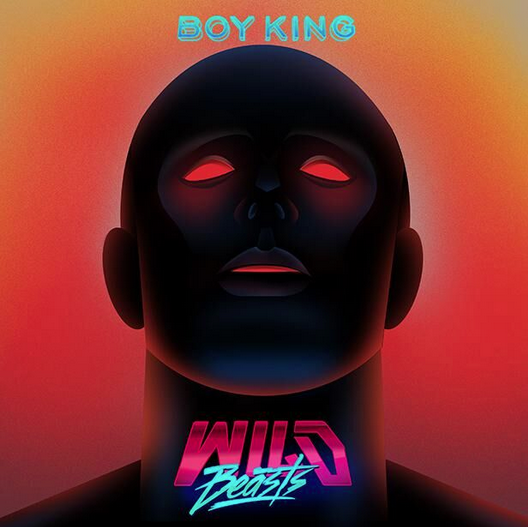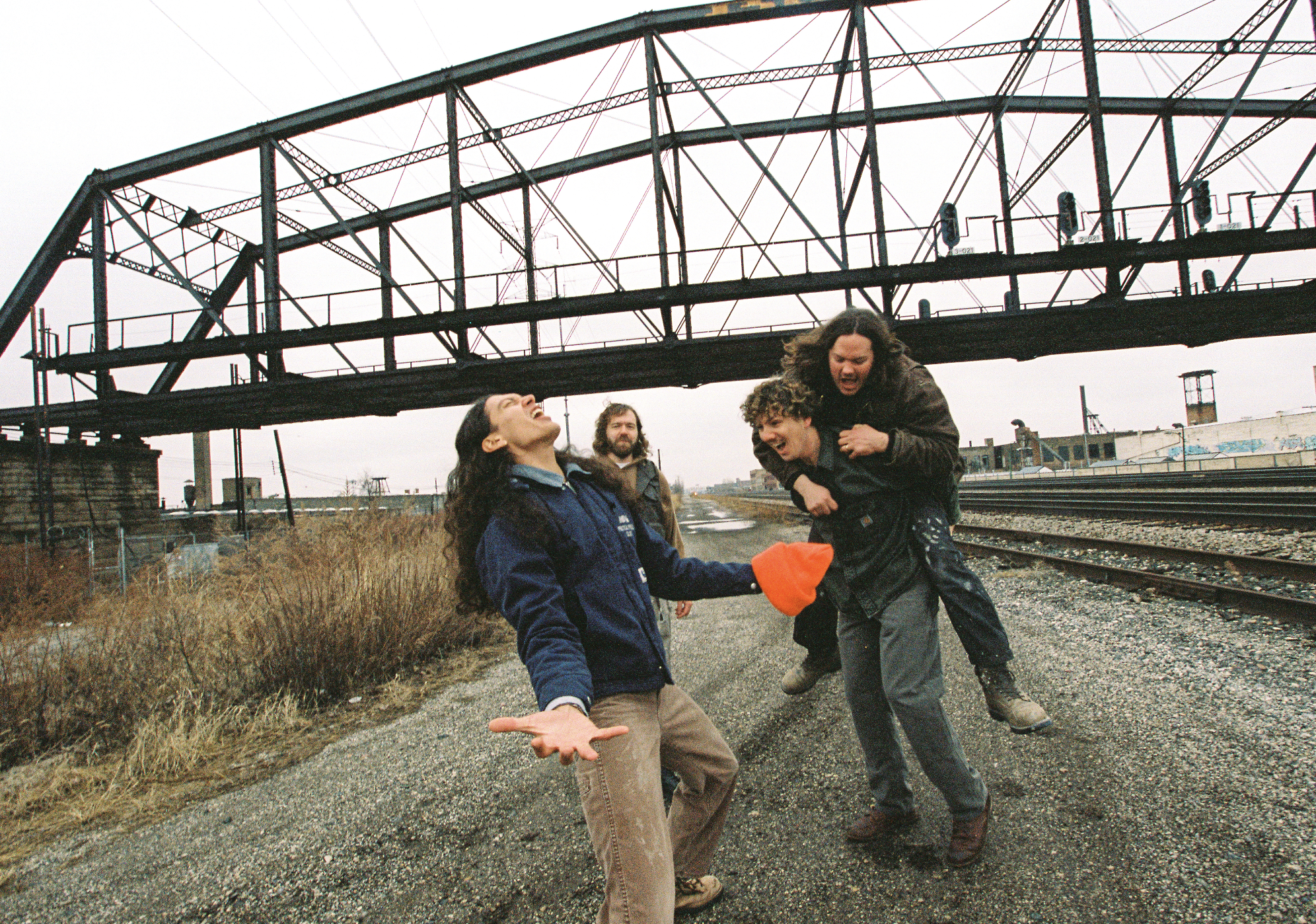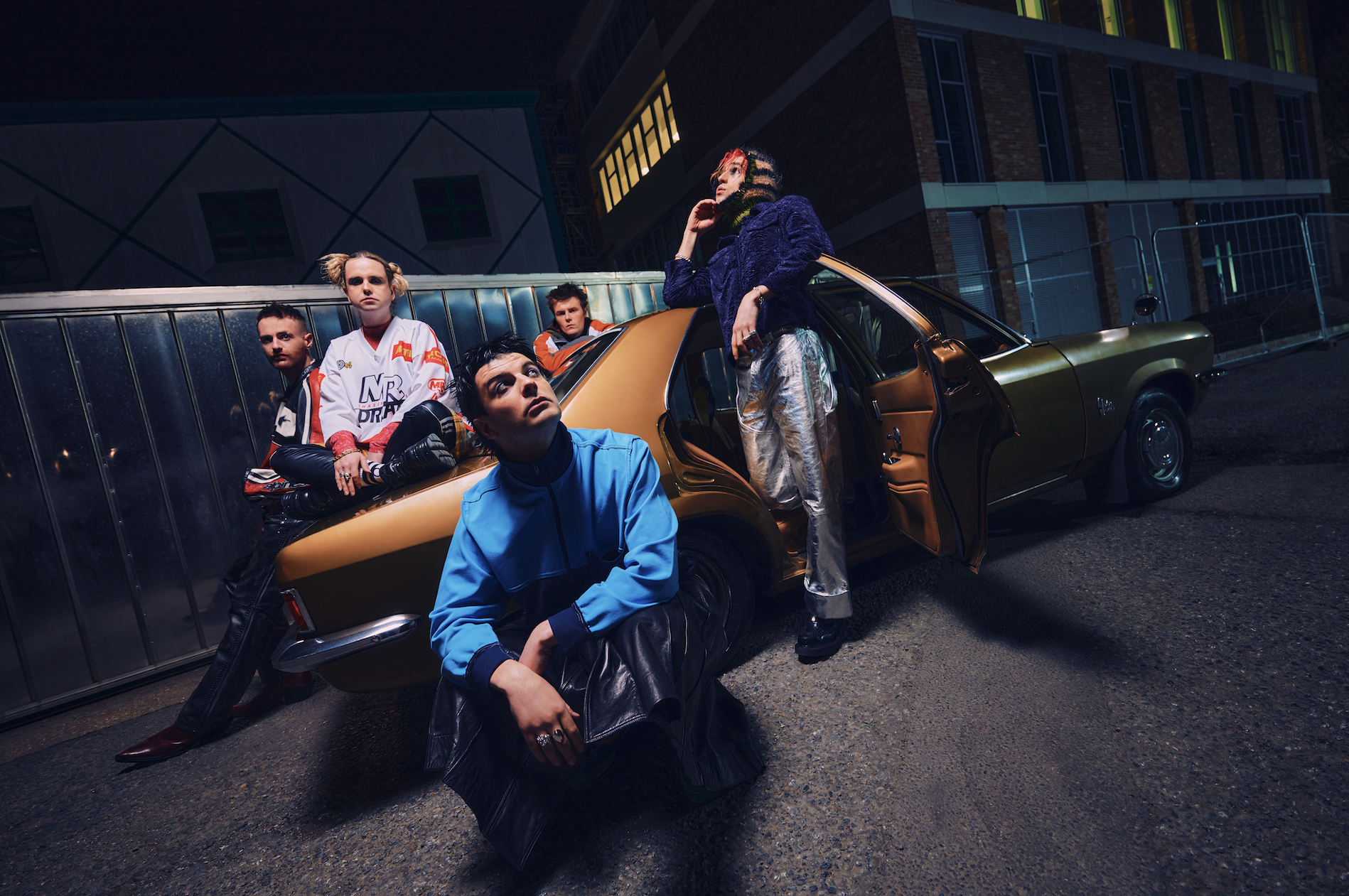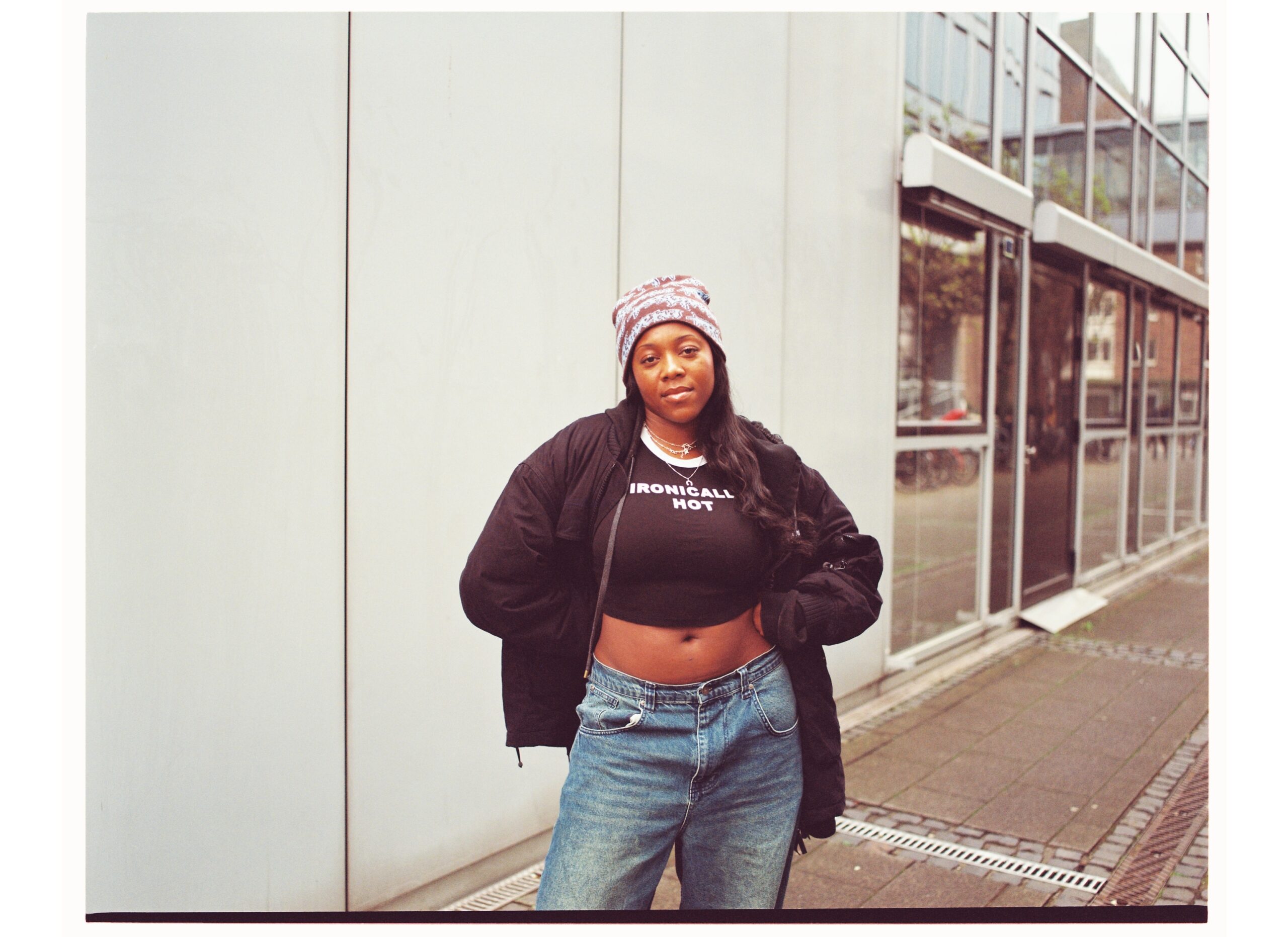Dance Pop? Punk Pop? Glamrock? Die Musik der Wild Beasts in eine Nische zu stecken war noch nie leicht. Anlässlich ihres fünften Albums haben sie jetzt die treffendste Beschreibung selbst gefunden: „Feminist Cock Rock“ lautet das wohl bestmögliche, selbstgewählte Genre-Labeling für ‘Boy King‘, wie Hayden Thorpe und Tom Fleming im Interview erzählten. Vor allem ist die Musik der Engländer auf ‘Boy King’ aber funky, sexy, elegant – und natürlich wild. Dabei immer gezeichnet von einem Männlichkeitsbild, das noch ein bisschen rougher und aggressiver als auf den vorherigen Alben daherkommt und trotzdem Platz für die Auseinandersetzung mit Weiblichkeitsbildern lässt. Wie das alles zusammenpasst, was es mit dem Weniger-ist-mehr-Prinzip ihrer Musik auf sich hat und auf welche Weise die vier Herren aus Kendal es immer wieder schaffen, all ihre übermännlichen Energien in ihren Songs zur Kunst zu stilisieren – darüber sprachen wir mit Tom Fleming und Hayden Thorpe in Berlin. Und auch wenn sie zugaben, dass sie gerne selbst noch ein bisschen rätseln über das, was sie tun und die Faszination um ihre Musik wohl stets schwer zu artikulieren bleibt: Warum die Wild Beasts eigentlich gerne ein kleines bisschen wie Beyoncé oder Kanye wären, lässt sich hier zumindest nachlesen…

When I heard that you’ll release a new album, I was really wondering in what kind of musical direction it might be going – maybe either going back to that kind of punk-attitude from the beginning or increasing the electronic elements even more than on ‘Present Tense’. Apparently you’ve gone for the second option: Do you agree with that? Has that been like a natural thing?
HAYDEN: I think electronic instruments anyway are just shortcuts; they are things that show the distance between our idea and our realization of it. So for instance: an iPad was featured quite prominently on the record. So the sounds are often just iPad sounds. So there’s not kind of a sophisticated electronic on that. It’s a bit crude and basic. But you can either spend ten minutes finding the right synths and plugging it in and getting it right or you can just take it from the iPad – and it’s done! And I think any device that shortens this distance is important.
TOM: I kind of feel like we thought “Oh when there is something like that – why don’t we just use that then?!” And I think it is funny that you mention or punk- or DIY-attitude, because this is still our kind of approach with these electronic sounds: it’s quite quick to work like that. And this record is certainly more aggressive than our last record, and our approach features a kind of dis-taste or dissatisfaction in our music.
Okay. So what is a ‘Boy King’?
HAYDEN: A ‘Boy King’ is kind of a metaphor for aspiring to be the vision and the projection of a man that you thought you were going to be: that kind of commanding, powerful, pull-it-together-person that is stable and strong. And about desperately trying to be that person, but being slaved and constantly regressing into that childish thing without emotional capacity to manage it.
The press text for ‘Boy King’ even said that this record is about the “dark side of manhood”. But I think this boy-man-topic has always been kind of a topic of yours.
TOM: Yes, thank you for noticing! (laughs) Sometimes it feels like as if it gets a bit lost! But yeah – this album is about the stuff that we’ve always been interested in, but now it is a bit more explicit, I think.
Yes, there are quite a few explicit references which occur in the album title, the track titles and in the lyrics. Where do you see this representation of manhood musically? Maybe one thing is that kind of impulsive usage of electronic devices – do you also see it in other musical processes?
HAYDEN: Yes, I think the most explicit male tool used on the album is that we’ve hijacked the kind of guitar. It’s like – when you’re a boy and you want to be an astronaut and you’re put in a space suit, or you want to be a fireman and put on a helmet. Or you want to be the rock guitarist and you put on the guitar.
TOM: And it’s funny because I always thought these kinds of cock-rock-guitar-moves they’re kind of very delicate and slinky – it’s very strange regarding the kind of macho-thing they imply. And then there’s that ridiculous widdly stuff that we do on the record… So I suppose, even if the guitar is kind of a macho tool, it is also a tool of abstraction. And I think we’re using it in a way that is kind of subversive as we’re using it against these kinds of synths and so it is slightly different, I think.
I feel like on this record I’m catching your lyrics better than on the previous ones. Is it just me or has there been a change – do you feel your lyrics have become more explicit as well and in that way understandable?
HAYDEN: I think any good craftsman finds more simple and elegant ways to do the same thing that he did before. So if we think about good songwriting – for example Springsteen and Dylan – these guys can do these powerful things in two or three chords, when we’re scrambling around with five or six. So I think maybe we got more efficient!
TOM: Yeah, I think if you listen to the record – there is not very much on this record. There are not very many ideas. Every last idea has the most juice squeezed out of it. And that is just us getting better. And also regarding the sound of the record – the drums and vocals are very present and upfront. And the lyrics are very clear. So I think there is not that much of ambiguity. That is something John Congleton and his production brought to, which meant that we had to be kind of brave about it and realize “okay, that’s what people are going to hear”. It was a lot about deciding what’s important and what’s not, I guess.
So, if you say “there’s not that many ideas on it” – that’s the thing you were aiming for then?
TOM: Yes, exactly. A few good ideas rather than lots of half-realized ones, you know.
Can you say a little bit about the track ‘Alpha Female’? This track stays very present once you heard it. So I was wondering – what’s it about?
HAYDEN: Well, I guess it’s born of personal experience: On a very basic level I disagree with the common notion in society that sexy women have to be subordinate, silent or domesticated – and there is a deep alert to aggressive, dominant and powerful women and the song is a celebration of that. But it’s also born of the experience that women close to us in our lives – you realize, they have to give more. It seems, they have to surrender or sacrifice more to attain the same things that we kind of walk in to. But as all our song it’s also a funky, sexy song driven by libido (laughs), but it’s driven by kind of a “tabu-libido”, isn’t it?
TOM: Well, yeah – I don’t want to use the word “feminist”, but you know – we’ve all drawn a lot from feminist writers. But it’s also kind of a cock-rock-song…
HAYDEN: You called it “feminist cock-rock”…
TOM: I call it feminist cock-rock, yeah… (laughs) And I think that’s what it is! I think a lot of this record is kind of cock-rock, but it’s about male doubt and fragility and frailty – and that is kind of what we’re interested in.
It’s very interesting that you say that. Because a question that comes to mind when you hear all these songs about this strong, impulsive manhood perspectives is, whether this naturally involves any kind of aversion against women or strong womanhood…
HAYDEN: Yes, exactly. I think it’s a suggestion that we can co-exist. And that you can be different people at different times – I think that is what this record is all about. That you can simultaneously be dark and destructive, but that can be for loving reasons.
So when you’re performing these kinds of overly manly characters through your songs: Do you think you’ve developed some kind of persona or role through the years? Or how much of that just comes naturally when you perform these songs?
TOM: I think it’s a little bit of both and it is also about allowing parts of yourself out, I guess, and giving a voice to things that you’re maybe not that comfortable with. But there is an element of that being a performance; do you know what I mean? Because this record is much more forthright and much more aggressive than our previous records…
HAYDEN: Yeah, those things – the shocking or violent bits, they are in me, of course they are. But I don’t think I’m a freak for that. Every human being has darker, less virtuous sides to their person. And they’re the mechanisms that I’ve got here, they’re the kind of primal tribes that make us who we are, I guess. So maybe it’s our responsibility to live them out a bit. And it’s a great privilege to do that through our art.
I feel you’re both sometimes performing kind of contrasting roles…
TOM: I’ve heard it said that I’m kind of the “conscience” almost. But I don’t know – it’s almost like on this record that Hayden’s songs are the “sex songs” and mine are the “violent songs” (laughs)… But I certainly know that we can do different things in our voices, when either of us sings a different line it’s always all different and I think we’re getting better at that: Like knowing what our voices can do and writing for each other and these kind of things… So it’s not like “this is how I feel”, it’s also about acting a little bit – and it’s a bit more deliberate than it once was, you know.
Okay, so you don’t always sing the lines you wrote…
TOM: Yeah, sometimes it is like that and sometimes it’s not. Sometimes we kind of hijack each other’s stuff like “oh, that’s not working – we take that and put it into something I’ve got”. So this record was a lot “work time” – we did a lot of actual songwriting rather than just trying stuff out. We kind of tried to structure things, so the songs also kind of lead into each other in that sense.
HAYDEN: It’s difficult to talk about that because it’s like talking about your own posture: It is hard to recognize in a very objective way what we’re actually doing here. And there is a sense of superstition and delicacy here where I don’t really want to know too much…
Yes, it’s probably good you can’t answer that question…
HAYDEN: Yes, then it would be like we had a meeting saying “Tom, you are this guy. I’m this guy. Let’s put our work into the right marketing position!”
TOM: In our work there is certainly an element of doing it first and then thinking “what did I do?” – not as an accident, but rather than thinking “what am I trying to do now?” And I think there are parts in our music that are very hard for us to articulate. You know, we say things about it, but hopefully there is still something about it which we don’t quite understand.
I became a fan with ‘Two Dancers’ – that was in 2009 – now it’s seven years later and you’ve already released five records. Many people who are into good music know you – but you’re not that kind of a huge, omnipresent headliner band – it seems more like a subtle, but constant and stable success. Has there ever been a decision regarding the areas of the pop-sphere where you want to be recognized in and where not?
TOM: Well, I think in an ideal world everyone would love the music we make for what it is and we would be huge arena fillers, but it’s not like that. And I think you have to sacrifice a lot to be that popular. So far we’ve done pretty well and this might be more of a pop record than we’ve made before, but even so it’s probably still quite odd.
HAYDEN: You give your work to the universe – and then it’s gone, it’s out there. We would traverse the earth for these songs and to play them for people who want to hear them.
TOM: I think we do a lot better in the UK than we do over here, which is to our sadness. But certainly we would like to play more here, but it’s like Hayden said: You have to kind of give it some patience to like our band, I think. We’re still working on it!
So it that something you wish to achieve with ‘Boy King’?
TOM: Well, we want our music to be enjoyed by as many people as possible without compromising what it is! We’re prepared to do anything – sure – but we won’t compromise the actual music, you know.
HAYDEN: I think the ultimate goal is: the more people you get your music out to, the more opportunities you get artistically and the more grand statements you can make. That’s the real drive, you know. You look at people way up – you see Beyoncé and Kanye and these guys who have this huge artistic licence to do whatever the fuck they want – and that’s kind of incredible. They can do weird things – and they do!
So how long have you been getting your music out to the people now?
TOM: Well, I was the last to join the band and I have been a member for 11 years.
HAYDEN: …and in that time you became completely maladjusted, and completely overspecialized in a very specific thing that is useless to every other thing. (laughs)
TOM: Yeah… But even before that – I was playing guitar since I was 11 and as a teenager you look at the world ahead of you and you’re like “shit, I don’t want to do that and that…” But I think we wanted to do this for a long time – even before we did it. And it takes that amount of time, I think. We were talking about the 10.000-hours-rule before. And it takes 10.000 hours to do anything – I believe in that.
…and you can really see that with you! That something good takes time. So thank you!
HAYDEN: Thanks for your questions!
‘Boy King’ erscheint am 05. August 2016 auf Domino Records.








